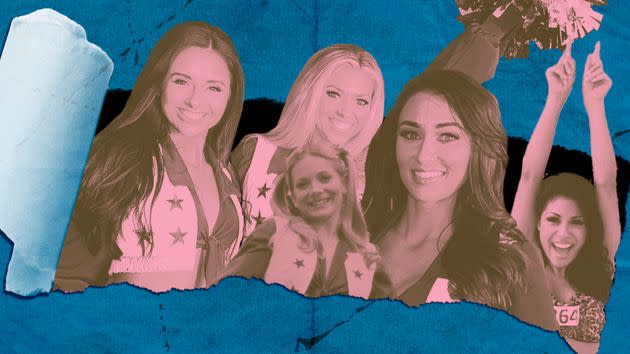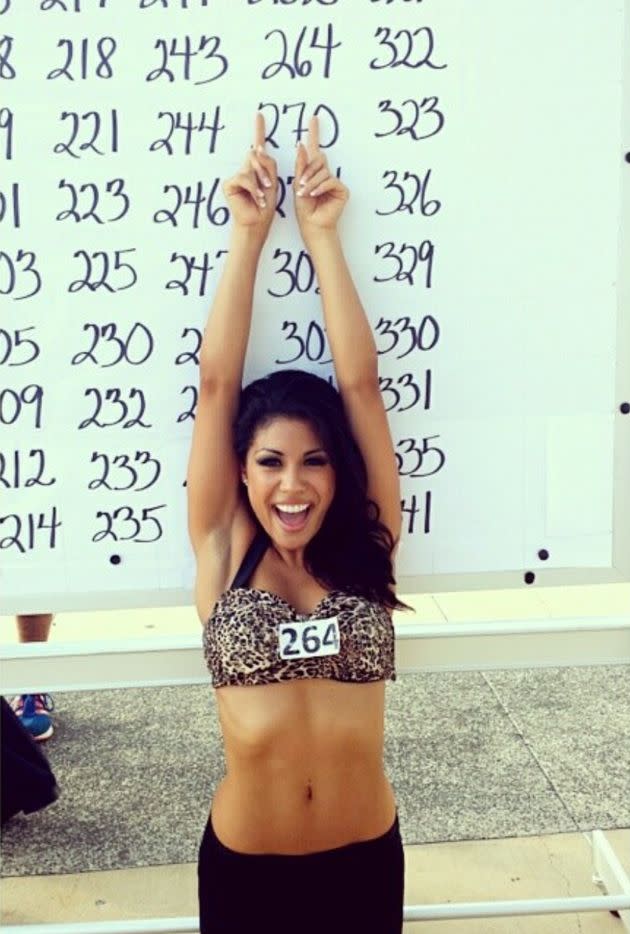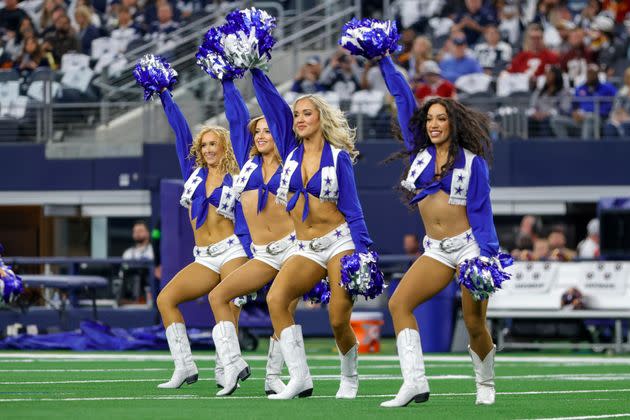Exploiting America's Sweethearts

In one of the more heartbreaking moments in Netflix’s docuseries “America’s Sweethearts: Dallas Cowboys Cheerleaders,” Victoria Kalina, a four-year veteran of the squad, says that cheering for the Dallas Cowboys is her dream. But it’s also “the thing that hurts me.”
Kalina was opening up about her yearslong battle with disordered eating alongside anxiety and depression, all of which flared during her time on the squad. Comments about her weight — from the cheer squad’s directors as well as her own Instagram followers — led Kalina toward depression and a complicated relationship with her body image.
“When I look [at myself] in the uniform, I’m always like, oh, man, I need to lose at least three pounds,” Kalina said on the Netflix docuseries, which was released today.
She added that to deal with her depression, she binges and purges food.
“It’s a binge to get that feel-good, that empty feeling filled again, but then game time comes, so then you just gotta get into those baby clothes, get into that baby uniform and that cycle just keeps going.”
Kalina’s experience isn’t new. She and other women on the squad dating back to the ’70s have experienced eating disorders, been victims of sexual harassment, and dealt with low pay that made it hard to justify being an NFL cheerleader.
In conjunction with the Netflix docuseries premiere, HuffPost spoke to two former Dallas Cowboys Cheerleaders and one woman who tried out for the team twice.
Cheering for the Cowboys and wearing the iconic uniform is a dream, the women said, but their experiences with the Cowboys included all the pitfalls that generations of cheerleaders have faced since the cheer squad’s inception in its current form in the ’70s: body and weight issues, disordered eating, sexual harassment, and low pay.
Weighing In
Body image issues and eating disorders have long plagued cheerleaders across the NFL. An old rulebook for the Dallas Cowboys Cheerleaders from the ’90s forbid gaining weight. Other teams have reportedly put cheerleaders through a “jiggle test,” which judged their body firmness at the risk of fines and penalties.
Tami Barber — a cheerleader in the ’70s known for her pigtails — said she developed anorexia because of the expectations the organization put on her.
“The self-image [issue] never ends,” Barber said in a 2018 documentary about the Dallas Cowboys Cheerleaders titled “Daughters of the Sexual Revolution.”
“I will always see the fat girl in the mirror,” she continued, echoing Kalina’s sentiments in Netflix’s new series.
Squad veterans aren’t the only ones who say they’ve been harmed by the organization’s unrealistic standards. Merely trying out to be one of “America’s Sweethearts” is a grueling process and often requires applicants to upend their lives just for the opportunity.
Vivian Williams might know that better than anyone. She auditioned to be a Dallas Cowboys Cheerleader in both 2013 and 2014, and prior to her first attempt, she lost 30 pounds in anticipation of what judges were looking for in a cheerleader’s body. Her audition process was documented on CMT’s “Dallas Cowboys Cheerleader: Making The Team,” a reality show that ran for 16 seasons from 2006 to 2021.
During an episode that aired in 2013, four veteran cheerleaders are put on probation because they’ve gained what they’re told is too much weight. Dallas Cowboys Cheerleaders Director Kelli Finglass reveals that the cheerleaders are obligated to maintain their audition weight.
“If not, they’re in breach of contract,” Finglass tells the camera.
Later in the episode, the cameras turn toward Williams when she tries on the famous Dallas Cowboys Cheerleaders uniform: White shorts and boots, blue top tied in a knot and a white vest.
Finglass, outside of Williams’ earshot, tells others in the room that Williams looks “short and thick,” that her white cowboy boots are almost to her knees, and that she has “huge quads, like a drumstick.”
You stop thinking about food as something that nourishes your body.Vivian Williams, Dallas Cowboys Cheerleader trainee
Williams didn’t know what Finglass had said about her body until she saw the episode air on TV.
“I think that’s when my anxiety started to develop,” she told HuffPost. “And I had struggled with panic attacks and anxiety attacks after the fact all the way up until now. I haven’t had very many this year, maybe three, but I still have them.”
A former Dallas Cowboys Cheerleader, who was on the squad roughly 10 years ago and asked to remain anonymous, told HuffPost that the organization was meticulous and even aggressive about cheerleaders’ weight. She and Williams said they were subjected to random weigh-ins, a practice that a Cowboys spokesperson said has not been in play for “a number of years.”
The former cheerleader said they were required to stay within five pounds of their audition weight at all times or face consequences that included full-game suspensions.
“To make that even worse, they would post the results in the locker room the next day after we would weigh in,” she said. “So you would walk in and just be so afraid that your name was going to be on this list that was just posted in the locker room for everyone to see.”
Williams said she weighed 120 pounds when she first tried out for the squad in 2013. But she didn’t make it — she was told she needed to lose an additional 10 pounds before the next season’s auditions.
Determined to impress Finglass and make the team, Williams under-ate, over-trained, and sat in the sauna for hours at a time. She lost more weight and tried out again for the 2014 season, three pounds lighter than when she first auditioned. But her personal training regimen led to what she called an “unhealthy relationship” with food.
“You stop thinking about food as something that nourishes your body,” she told HuffPost. “When I’d have a ‘cheat’ meal, I’d have to punish myself by going to the gym for an extra hour or not eating for an extended amount of time. And it was just because I had to be a certain weight. And I didn’t care how I got to that weight.”

Both Williams and the anonymous former squad member said the Cowboys offered them little to no resources to maintain healthy nutrition or weight. On the CMT show, there’s a segment in which some cheerleaders were offered a partnership with My Fit Foods, a meal prep company ostensibly there to help cheerleaders build healthy meal plans. But Williams said she wasn’t invited to take part, and the former squad member claimed the entire program was bogus.
“They just do stuff on the show to look like they’re doing the right thing,” the former squad member said. “But in reality, no, there’s no nutritionist for us to speak with. There’s no trainer.”
In a statement to HuffPost, a Dallas Cowboys spokesperson said the team offers cheerleaders access to independent fitness and mental health consultants, a dedicated athletic trainer, and credits for a meal program.
When Williams returned to audition in 2014, she said Finglass told her she was “inconsistent” with her weight and dancing and that she was “self-consumed with the mirror.” She didn’t make the team for a second time.
Finglass didn’t respond to HuffPost’s request for comment, but on Monday, in an interview with Entertainment Tonight, she said the squad doesn’t talk about weight anymore.
Williams said her experience trying out for the Dallas Cowboys Cheerleaders — plus having those efforts documented on reality TV — caused her to struggle with body dysmorphia and bulimia for a few years, something she said she has since recovered from.
“I felt like I needed to get the bad stuff out, in a sense,” she said. “And that was the only way that I could cope with it at the time.”
The anonymous former cheerleader said the random weigh-ins gave her anxiety and strained her relationship with food. She remembers that one time, just before a practice that lasted at least three hours, she ate half a turkey sandwich in the car while her then-boyfriend dropped her off in the parking lot, and she was filled with anxiety.
“I was freaking out, and he’s like, ‘What’s wrong?’ I’m like, ‘I don’t know if I should eat the other half of the sandwich; we might have a weigh-in. I don’t know what to do.’ I was still hungry, so I ate the other part of my sandwich, and I remember just crying,” she said.
“And he probably thought I was a crazy person, but I can just remember him being like, ‘It’s OK. You just ate a healthy turkey sandwich.’ And I was like, ‘No, you don’t understand. If they weigh us in, and I’ve eaten today, and if I’m up, I’m gonna get in trouble.’”
She said consequences ranged from not being allowed to make appearances in the uniform to not being allowed to cheer in a game.
World-Class Athletes, Minimum Wage
In 2019, after NFL players spoke out about their mental health struggles, the NFL and the players union agreed to employ a behavioral health clinician for each team.
NFL cheerleaders, meanwhile, aren’t unionized and have no governing body beyond whatever oversight and resources their football team gives them. Many squads are independent of their respective teams, and some teams consider their cheerleaders to be contractors. Most NFL cheerleaders have to work an extra job; an issue that gained publicity earlier this year when several squads participated in a social media trend revealing their day jobs.
With little outside advocacy, it’s been up to individual cheerleaders to fight for better pay.
In 2018, Dallas Cowboys Cheerleader Erica Wilkins sued the Cowboys organization, claiming that she was paid less than minimum wage and that the football team’s mascot made more than the cheerleaders. No other cheerleaders joined the suit. Still, the Cowboys settled out of the suit, and the cheerleaders’ game-day pay was reportedly raised to $400 per game.
In a statement to HuffPost, the Cowboys organization said the cheerleaders’ compensation has increased over the years, but the rates are not public.
However, cheerleaders say low pay remains an issue, including in Dallas. In the Netflix docuseries, Kat Puryear, a cheerleader who was on the squad from 2019 to 2023, said she was paid about the same as a substitute teacher or a full-time Chick-fil-A employee. The team’s response: Cheerleaders work for the sisterhood and the passion for dance, not the money.
It’s unfortunate that with how much they pretend or say that we are important and the face of the organization, the way they treat us and pay us does not come near to equal that.Former Dallas Cowboys Cheerleader
“There’s a lot of cynicism around pay for NFL cheerleaders, and as it should be,” Charlotte Jones, chief brand officer of the Dallas Cowboys, said in the docuseries. “They’re not paid a lot. But the facts are that they actually don’t come here for the money. They come here for something that’s actually bigger than that to them.”
Another woman who started to cheer for the Cowboys in 2021 and asked to remain anonymous told HuffPost she was paid $12.50 per hour for practices and $400 for each game. Cheerleaders only perform during home games, but each one requires a commitment of more than 12 hours, she said. Appearance rates went up each year a cheerleader was on the team, so she was paid $100 for appearances her first year and it increased $100 every year after that.
While football players cash in on sponsorships with companies like Nike, Dallas’ cheerleaders aren’t allowed to use their titles to secure their own sponsorship deals, nor can they sign with social media influencer agencies, the former cheerleader said. With limited opportunities to make money as a squad member, she had to work an additional full-time office job every weekday.
“It’s kind of a running joke for the girls on the team: The guys on the practice squad, who don’t even touch the field half of the time, getting 80 grand more than we do a year. And I’m at every single game, dancing my ass off, and every other appearance, and my face is all over The Star,” she said, referring to the Cowboys’ headquarters and practice facility. “You don’t even know who these guys on the practice team are.”
She continued: “It’s unfortunate that with how much they pretend or say that we are important and the face of the organization, the way they treat us and pay us does not come near to equal that.”
Generational Harassment
While the cheerleaders are working for the same pay as a fast food employee, they are also subject to stalking, sexual harassment and assault. In “Daughters of the Sexual Revolution,” cheerleaders from the ’70s said fans would call their homes and send threatening letters.
Those threats still exist today. Kelcey Wetterberg, a Dallas Cowboys Cheerleader from 2019 to 2023, said on the Netflixdocuseries that someone placed an AirTag on her car, and police weren’t much help. The incident left her paranoid, looking over her shoulders and writing down the license plate numbers of cars she thought might be following her.
“I couldn’t live that anxious all the time,” she said through tears. “Like, not sleep, not eat because I was so scared of what was going to happen. I had to just pray and say, if this is something that’s going to happen to me, it’s going to happen to me, but I can’t live in fear all the time.”
In 2016, the Cowboys settled with four cheerleaders for $2.4 million after they accused a senior team executive of taking photos of them in the locker room undressing. The exec denied the allegations, and the Cowboys said they found no proof of any wrongdoing. Afterward, Cowboys owner Jerry Jones said the settlement showed that the team took the allegations seriously.
But cheerleaders say they continue to experience harassment. In the Netflix docuseries, a cheerleader files a police report after saying that a game-day photographer touched her inappropriately. Her fellow cheerleaders rally around her, hopeful that her speaking up might give other victims of sexual assault and harassment the courage to do the same.
In a statement to HuffPost about the incident, the Dallas Cowboys said, “Safety and security are always a core imperative for us with the Cheerleaders. In this specific situation, on-site Arlington Police Department officers were immediately engaged. A thorough review of the incident was initiated quickly. Any contact was determined to be unintentional and no charges were deemed to be appropriate by APD.”

The cheerleader who joined the squad in 2021 told HuffPost that she also dealt with inappropriate touching. She remembers a man tickling her down her back at an appearance. She said the squad didn’t have its own security at that appearance because it was outside of Dallas, and she didn’t tell a Cowboys staff member at the event because she didn’t feel like there was open communication between staff and the cheerleaders.
“But it could have been my own fault for not saying something [to staff],” she said.
Then she corrects herself.
“It’s hard, because we are itemized sometimes as an object instead of a human, and we start to almost believe that ourselves.”
‘They Don’t Care About You’
While the Dallas Cowboys Cheerleaders say they are still experiencing the same issues they were 50 years ago, few are willing to speak out.
After some of the cheerleaders on the Buffalo Bills’ cheerleading squad, the Buffalo Jills, sued for wage violations and poor working conditions in 2014, the Bills shut down the squad entirely. They have yet to make a return.Cheerleaders are taught that they are replaceable and that it’s a privilege to wear the uniform.
“They don’t care about you,” said the former cheerleader who was on the Cowboys squad a decade ago. “You’re a number to them and they don’t care. You just show up and look good and do what you’re supposed to do, and they don’t really care how that happens.”
The former cheerleader who joined the squad in 2021 echoed that sentiment.
“People refer to you as an ant on the field, and sadly, that’s how it feels,” she said. “You do not feel valued or cared for, or important in any way financially, physically, emotionally, mentally. I felt like when I left, it meant nothing to them, which is unfortunate for how much I poured into the years that I was there.”
The cheerleader said there are pros and cons to every job, and a higher wage could make it easier to be a Dallas Cowboys Cheerleader.
“I think there’s a give and a take, but there’s not enough give for what’s being taken,” she said.
If you’re struggling with an eating disorder, call or text 988 or chat 988lifeline.org for support.

 Yahoo News
Yahoo News 